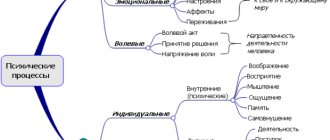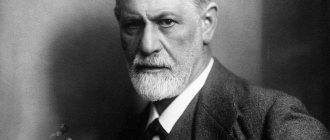What is free will?
Free will is the freedom to choose from a number of possibilities, which is limited only by a person’s sense of self and his interpretation of his own image of “I”.
Free will, no matter how paradoxical it may sound, has a number of limiting or guiding factors.
These include a person’s attitudes, relationships with other members of society, upbringing, background desires, etc.
And true willpower does not ignore these moments, but comes to a compromise solution, choosing and implementing the most optimal behavioral strategy in a given situation.
Freedom and will - what's the difference? Freedom without will turns into arbitrariness. It makes it possible to perform any actions, but does not provide control over the situation.
It is the will that solves this problem, allowing the individual to predict the results of his actions and evaluate the appropriateness of actions.
Volitional personality traits
In the process of realizing the will and working to destroy/correct obstacles, a person seems to be working to develop certain qualities in himself that are directly related to the act of will.
First stage:
- determination (a conscious and active desire to achieve what you want by implementing certain actions);
- initiative (desire to be active);
- independence (a person’s attitude in which he passes the instructions of strangers through an internal filter, refusing to act according to advice that is contrary to personal attitudes);
- endurance (control over one’s own thoughts and actions in order to overcome factors that interfere with achieving the goal).
Second stage:
- decisiveness (the ability to quickly make and further implement firm decisions);
- courage (the ability to overcome fear and take risks for the sake of a potential positive result).
Third stage:
- energy (the ability of an individual to mobilize all his resources to obtain a result according to personal desire);
- perseverance (an individual’s ability to constantly maintain strength to continuously work towards achieving a set goal);
- organization (the ability to plan activities in order to streamline them)
- discipline (the ability to bring one’s behavior into a form that corresponds to the general norms and nuances of doing business)
- self-control (the ability to ignore momentary impulses that run counter to the goal and the ability to subjugate one’s internal impulses).
Will as a mental process
Will is a mental process. Any manifestation of will requires a person to activate the neuropsychic element, physical, mental and moral forces .
Volitional behavior is associated with overcoming barriers (time, space, attitude, exhaustion, emotional depression, etc.), since most goals are not achieved immediately after the planning stage, but after some time necessary to resolve issues and problems.
When running away from pursuers, a person can bypass many obstacles, but this will not be a volitional action, since the individual is subject to an external, not an internal stimulus.
Properties of will:
- strength (an indicator of “acceleration” of volitional effort);
- stability (constancy of active manifestations under repeated conditions);
- breadth (variety of activities requiring volitional regulation).
Will and habits
In many ways, the formation of will is helped by exercise associated with giving up bad habits and developing useful ones. Any person has harmful ones, even if the person does not talk about them; in the depths of consciousness there is a desire to leave them in the past. Some people want to give up tobacco products or alcohol, others want to adjust their diet. By the way, some people believe that you can quit smoking by always keeping a pack of cigarettes with you. This opinion is wrong. Restriction provokes an even stronger desire, but in the absence of restriction, activity is completely determined by volitional efforts.
Forming new habits also involves effort: a habit is an action performed unconsciously. Once you have formed it for yourself, you need to introduce it into everyday life and resort to action so often that it becomes an integral part of your personality. Some time must pass - only then will what is done become an organic part of everyday life, not requiring additional effort. If you can achieve this, you can confidently talk about successful willpower training.
Meaning
If a person has willpower, his activities are filled with meaning. The individual turns into a conscious person who acts based on set goals, and not on the basis of instincts.
on this strength . It is simply impossible to achieve success without volitional effort, since the body will constantly switch to primitive needs or turn on the function of self-preservation (conserving resources) in the face of problems and obstacles.
Also, in the absence of willpower, a person will lose his moral contour, because it is the will that allows you to build your activities based on the moral norms accepted in society.
If there is a will, everything is achievable , because a person can subordinate himself to a goal.
Making decisions
In the process of composing a plan for the implementation of a goal that interests an individual, the decision-making process finds expression in different forms. If the impulse that arises in a person at a given moment does not conflict with the internal aspects of mental activity, then in this case the decision is not allocated by consciousness to a special stage. Moreover, there are often no external barriers to achieving the goal towards which this impulse is directed.
There are times when a solution appears as if by itself. This occurs when a person understands that the decision is not optimal, but under such circumstances it is impossible to make a different decision. Such decisions are usually made by people in hopeless situations, for example, in a fire, jumping out of a window, which may be the only chance to save a life.
It happens that opposing motives that overcome a person at the moment of making a decision retain their strength until the very end, while all possibilities for the development of events are preserved.
Then one of the motives is chosen as dominant, not because the others have exhausted their effective force or attractiveness, but because of the awareness of the need to sacrifice the remaining motives to the main one.
Physiological basis
The foundations of volitional behavior at the physiological level begin with the frontal part of the cerebral cortex , where the zone responsible for movements is located.
It is connected with other parts of the cortex, including the analyzers.
Thanks to this connection, a stimulus arising in one of the sections of the cortex easily reaches the motor area and provokes the same process in it. But management is impossible without editing .
Therefore, the reticular formation (a formation stretching along the cerebral cortex) is very important, since it acts as a filtering element (separates important impulses approaching the cortex from impulses that are not critical).
Structure
Volitional action can be simple (a person immediately sees a possible short path to a goal and moves in this direction) and complex (the goal leads to a conflict of motives).
The structure of complex volitional action:
- Awareness of the final task (goal) and the desire to achieve it.
- Analysis and awareness of opportunities to achieve the goal.
- The appearance of incentives confirming or denying this possibility.
- Confrontation of motives and choice.
- Acceptance of one solution option (from among possible ones).
- Turning the plan into reality.
- Overcoming external barriers and achieving goals.
Types in the table
The most common types (manifestations):
- courage (manifestation of strong-willed qualities in extreme situations);
- discipline (manifestation of strong-willed qualities in the case when the emotional and physical state impede the achievement of the goal);
- decisiveness (the ability to make complex and responsible decisions without outside help, while ignoring obstacles);
- patience (mobilization of volitional qualities in conditions of prolonged tension or stagnation);
- self-confidence (confidence in one's own success even in the face of difficulties).
Modern science divides the will into three dominant types in the psyche .
| View | Meaning |
| Free or spiritual will | A trait inherent in religious people. A volitional action in which a person, guided by higher goals (faith), makes a difficult decision. |
| Natural will | The ability to make simple choices, think, adjust one's behavior in accordance with personal principles, etc. |
| Forced will | The ability to follow a certain behavioral strategy in a forced mode, as a response to difficult life circumstances. |
General concept of will
Definition 1
Will - is the process of a person’s conscious regulation of the manifestations of his behavior and activities, which is expressed in a person’s ability to overcome emerging internal and external difficulties, while performing purposeful actions and deeds.
The processes of regulation of human behavior and activity can take place at three levels:
- sensory-perceptual level;
- arbitrary level;
- volitional level.
Properties
Properties of will:
- has a stable connection with the concept of “need”;
- forms and requires the formation of a detailed intellectual plan that guarantees movement towards the goal;
- conscious mediation;
- involvement in a volitional act of other mental processes (attention, memory, intellectual activity, etc.).
Functions
There are three functions, each of which can replace another function as needed in the process of an act of will.
- Initiating . Encourages a person to begin implementing certain strategies, to “turn on” a certain pattern of behavior or activity in order to overcome barriers.
- Stabilizing . Aimed at maintaining a person’s activity during periods of stagnation or the emergence of new obstacles on the way to the goal.
- Inhibitory . It is aimed at inhibiting incentives and motives that are not related to the main goal and interrupt the main desire to achieve what is planned.
A separate block is the genetic, generative and productive function, through which the volitional properties of the individual are formed.
The main functions of the will - diagram:
Development of the situation
Willpower in a person’s life is not only a mental function that has selective implications. Suppose a person finds himself in a situation where he has several options for the development of events, each of which entails certain consequences. Having determined which option is most preferable in the current circumstances, the person activates the initiating volitional functionality. It consists of applying a series of efforts to implement a certain scenario. Since all the alternative motives that had to be encountered at the stage of implementing the selective volitional function have not yet weakened, efforts have to be made to eliminate all those motives in favor of which a decision was not made.
A person with a strong will implements what is planned, strictly adhering to the plan drawn up initially. He determines for himself specific actions, routes and sequences, strictly observing them in life, not allowing deviation in favor of momentary desires. In psychology, this is called a stabilizing volitional function, thanks to which you can adhere to a certain level of activity, despite the problems and difficulties that arise. Often, a person, engaged in a certain action, imagines various situations that may follow, forms plans, the implementation of which will be beneficial. This is called voluntary regulation of mental processes and actions occurring within a person’s personality and in the outside world. If it is possible to determine an additional motive, to formulate why the action that was chosen at the selective stage is needed, if it is possible to formulate for oneself a truly important result that a person is ready to strive for, while changing the motivation and supplementing it with new points formed based on the imagination, talk about changing the role of the implemented action in human life due to volitional effort.
Theories: briefly
Historically, the concept was considered through a philosophical, aesthetic and natural science approach .
But the view of will changed and transformed constantly.
Science identifies several key psychological theories:
- Ancient representations. The philosophers of ancient Greece believed that the root of conscious action was hidden in the mind. Aristotle linked will and logical conclusions together, considering the former to be a consequence of the latter. In the Middle Ages , will was not isolated as a separate issue requiring consideration. Theological scientists of the Middle Ages denied the presence of an active principle in humans, since they saw people as dependent on divine power.
- Renaissance. They began to consider a person as an individual, attributing to him a creative streak and the right to make mistakes. At the same time, freedom of will began to be considered the main dignity of the individual. A. Camus, K. Jasper and M. Heidegger examine the issue of freedom, attributing to it absolute will, not limited by external and social conditions.
A person in this theory is not connected with society, including the moral element and responsibility. - Natural scientific interpretation. In the works of I.P. Pavlova's will was an “instinct of freedom” and a reaction to the restriction of natural human activity. In its strength, this instinct can compete with the instinct of hunger. Pavlov viewed it as a reflex phenomenon.
- Will as consciousness . Volitional activity is considered as active, leaving a person the right to regulate this activity and forms of behavior. The theory was supported by the works of N.A. Brownstein and P.K. Anokhina.
- Other views. Sigmund Freud and E. Fromma considered this phenomenon as transformed human biological energy. K. Lorenz sees aggression in this energy. K.G. Jung and A. Adler notice the relationship between will and social factors.
Diagnostics
Methods for analyzing the volitional sphere can be divided into two basic groups:
- extensive;
- experimental.
Extensive methods involve finding the experimental subject in natural conditions and studying the picture using the assessment method, the method of self-assessment and generalization of characteristics, testing, conversation, interview, etc.
Experimental methods involve laboratory conditions and a pre-prepared experimental plan.
Violations
Types of violation of will:
- Hypobulia - in this state, volitional activity decreases. This disorder is typical for lazy, slow people who find it difficult to decide to do something outside their comfort zone.
- Abulia - lack of will, weakening of will, indecision. The individual is afraid to make decisions on his own, does not take the initiative in a group of other people, and tries to be in the background.
- Hyperbulia is an unhealthy activity. It appears in people with manic tendencies. They take on many things at once and never finish anything.
If violations of the will are detected, the person needs to be provided with appropriate psychological assistance.
Research methodology
The development of will occurs gradually. If at the initial stages of personality development a child performs involuntary actions, then gradually he comes to understand the need for volitional regulation of behavior.
To analyze the degree of development of will in an individual, special techniques :
- Characteristics of volitional effort. The subject holds a dumbbell weighing 1 kg in his outstretched hand, describing the sensations on the proposed scale (tired, very tired, etc.)
- Rosenbat method. Maximum possible hand tension followed by an increase in load.
- Tapping test. Analysis of muscle force potential by controlled and uncontrolled pen hitting a square.
- Leg balance.
- Stability of volitional effort. Proofreading the text to look for typos and further analysis of the results.
- Breath holding (analysis based on the duration of the exercise and the behavior of the experimental subject) according to the method of S.V. Korzha.
- Special questionnaires.
Create and develop
In psychology, human will is the quality thanks to which a creative person organizes life, despite the problems of the surrounding world. A person who has this mental characteristic in a pronounced form is able to deal with difficulties and overcome them. Some call will the ability to exist despite the need to fight, while others say that tension itself can already be called will. If he is not in life, it is wrong to call a person strong-willed. To develop this quality, it is necessary to show wisdom and strive for civility. A strong-willed person is one who can and is ready to cooperate and through this make his life more effective. By organizing a life situation, taking into account prospects and one’s own accumulated wealth, a strong-willed person achieves success. To some extent, it is the mental function in question that provides the possibility of development and is the way in which it occurs. It is formed and improved, and manifests itself most clearly in conditions of negative motivation, that is, a situation when a person clearly understands what kind of person she does not want to be, and is ready to make every effort to avoid becoming such a person.
The character and will of a person are the mental characteristics of an individual, improving and developing over the years. Psychologists specializing in these issues call for developing the will, making efforts to do so within reason. By overloading oneself, a person will not receive any positive outcome. Volitional loads must be combined with positive motives, taking into account that will to some extent is a force, but it reflects not muscle mass and its fitness, but character traits. To properly manage your resources, you need to be wise, be able to correctly analyze what is happening, and make rational efforts. Will allows a person to move towards an elusive goal, but it can also be a tool through which the creative search for an alternative path becomes more effective and simpler.









